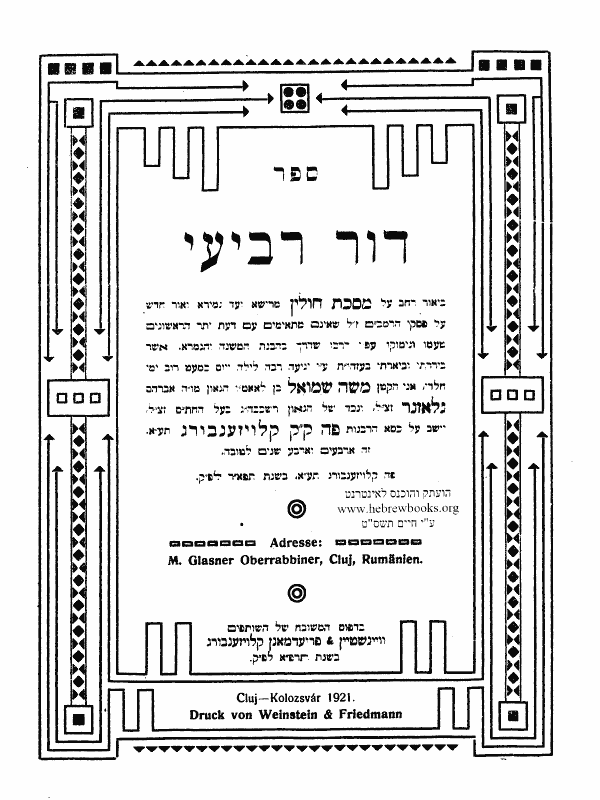ועשית עמדי חסד ואמת אל נא תקברני במצרים and deal kindly and truly with me; bury me not, I beg you, in Egypt Genesis 47:29 The Midrash (Genesis Rabbah) understands Jacob’s request of Joseph to mean that he did not want the Egyptians to use him as a medium of redemption, for it is written…
דף י”ג
דף י”ג ע”א גמר’ בעי מני’ שמואל מר”ה. מנין למתעסק בקדשים שהוא פסול. פרש”י ז”ל “כלומר מנין למתעסק שהוא פסול מקדשים וכו’”. רצה לתקן בזה דקבעי על מתעסק מה דינו בקדשים, והיינו כמו לעיל בפלוגתא דר”נ ורבנן דזרק סכין, אבל לא תימא דמתעסק בקדשים וסבר שהוא חולין, אבל השחיתה היתה בכוונה. וזה לכאור׳ מן התימא’…
Welcome to the Dor Revi’i on the Daf Blog
About two years ago, the idea occurred to me to try to make the Dor Revi’i, the classic commentary of my great-grandfather R. Moshe Shmuel Glasner on masekhet Hullin, accessible to those studying the daf yomi when the daf would reach Hullin. That time is now fast approaching. Moshe Shmuel Glasner was the Chief Rabbi of Klausenburg for 44 years…
Hanukkah
The Midrash (included in Yalkut Eliezer) quotes one passage from the verse (Psalms 13:6) “יגל לבי בישועתך” (my heart will exult in Your deliverance) and associates the passage with Media (מדי) (i.e., the miracle of Purim), and then quotes the next passage of that verse “אשירה לה’ כי גמל עלי” (I will sing to the…
ליום הכפורים
האומר אחטא ואשוב אחטא ואשוב אין מספיקין בידו לעשות תשובה If one says I will transgress, and then repent; I will transgress and then repent,” Heaven does not afford him the opportunity to repent. Yoma 8:9 The Gemara (Yoma 87a) asks why one has to repeat the statement that he will transgress a prohibition in…
סדר האזינו
האזינו השמים ואדברה ותשמע הארץ אמרי פי Give ear, ye heavens, and I will speak; and let the earth hear the words of my mouth Deuteronomy 32:1 Our master explained this verse in accord with the commentators on the piyut of the High Holy Days “לאדם מערכי לב ומה’ מענה לשון” (a man may prepare…
לראש השנה
UPDATED and AUGMENTED במשנה (ראש השנה כ”ו ע״א): כל השופרות כשרים חוץ משל פרה מפני שהוא קרן, אמר רבי יוסי והלא כל השופרות נקראו קרן שנאמר (יהושע ו, ה) במשך בקרן היוֹבל We learn in the Mishnah that all the horns (השופרות) except that of a cow (פרה) may be used to fulfill the commandment…
סדר וילך
וילך משה וידבר את הדברים האלה And Moses went and he spoke these words Deuteronomy 31:1 Our Master explained that we find here a correct allusion to the custom that one who holds forth in public to offer words of moral instruction (מוסר) should preface his remarks with words of halakhah before speaking words of…
סדר נצבים
אתם נצבים היום כלכם You are standing this day all of you Deuteronomy 29:10 An Aggadic explanation: Why is this section (beginning with: “אתם נצבים היום”) juxtaposed to the curses of the previous chapter? Because, upon hearing these ninety-eight curses besides the forty-nine that are contained in Leviticus 26, they grew pale asking in despair:…
סדר כי תבוא
היוֹם הזה ה’ אלקיך מצוך לעשות את החקים האלה ואת המשפטים ושמרת ועשית אותם בכל לבבך ובכל נפשך This day the Lord your God has commanded you to do these statutes and judgments; you shall therefore keep and do them with all your heart, and with all your soul Deuteronomy 26:16 In the Midrash Tanhuma…
סדר כי תצא
כי תהיין לאישׁ שתי נשים וכו’ לא יוכל לבכר את בן האהובה על פני בן השְנואה הבכר If a man has two wives, one beloved, and another hated . . . that he may not make the son of the beloved firstborn before the son of the hated, who is indeed the firstborn Deuteronomy 21:15-16…
סדר שפטים
שפטים ושטרים תתן לך בכל שעריך אשר יהוה אלהֶיך נתן לך לשבטיך ושפטו את העם משפט צדק Judges and officers shall you appoint in all your gates . . . and they shall judge the people with just judgment. Deuteronomy 16:16 Rashi comments: appoint judges who are expert and righteous to render righteous judgment Rashi…
סדר ראה
ראה אנכי נתן לפניכם היום ברכה וקללה Behold, I set before you this day a blessing and a curse Deuteronomy 11:26 The verse begins with an imperative verb in the singular — “ראה” instead of “ראו” — but then changes to a plural pronoun — “לפניכם” instead of “לפניך”. The verse may be understood in…
